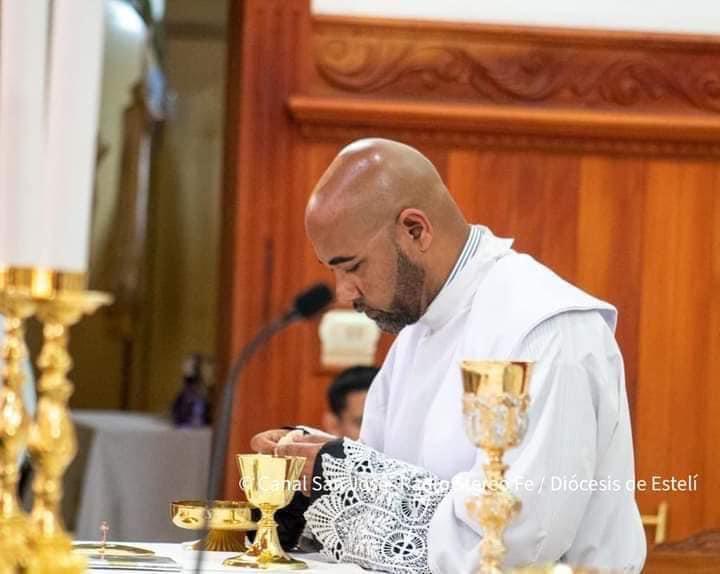5 de abril 2023

Children of Exile: The Births “Sowing Hope” in the Camp of Nicaraguan Farmers

PUBLICIDAD 1M
PUBLICIDAD 4D
PUBLICIDAD 5D
Donancio Alarcon was in charge of a church belonging to the diocese administered by the imprisoned bishop Rolando Alvarez.

El sacerdote panameño Donaciano Alarcón durante la Misa Crismal, el lunes santo. Foto: Tomada de redes sociales
The regime of Daniel Ortega and Rosario Murillo expelled Panamanian priest Donancio Alarcon on Monday night, who was abandoned “barefoot” by the National Police at the “El Espino” border with Honduras. Alarcon, who was in charge of the María Auxiliadora parish, participated Monday morning in the Chrism Mass at the Cathedral in Estelí, which was presided over by Cardinal Leopoldo Brenes.
The expulsion of Alarcon was reported on Tuesday by the Catholic media of the Archdiocese of Panama, Panorama Catolico, which on its Twitter account highlighted “they left him barefoot on the border with Honduras.”
According to Panorama Catolico, the 49-year-old priest, who carried out his pastoral mission in San Jose de Cusmapa, Madriz, is now in San Marcos Colon, a municipality in Honduras, on the border with Nicaragua.
“We continue to pray for the Sister Church of Nicaragua, which, despite everything, continues with an unwavering faith,” said Panorama Catolico.
The María Auxiliadora parish is part of the Diocese of Estelí, whose apostolic administrator is Bishop Rolando Alvarez, who is detained in the La Modelo prison outside Managua and was unjustly sentenced to 26 years and four months in prison.
A parishioner confided to Article 66 that Alarcon was “arrested in the Cucamonga sector and they did not give him more time than to come and bring his papers from Las Sabanas (Madriz municipality) and they took him to Honduras.”
Likewise, another source said that, during the Eucharist on Palm Sunday in his parish they asked for prayers for Bishop Alvarez. He did not preside over the mass, but they believe that the expulsion “was reprisal because he was the one who on several occasions had raised prayers for Álvarez.”
Last Friday, the newspaper La Prensa reported that the Ortega regime prevented priest Nestor Mendoza, parish priest of a church in Palacagüina, from the same Diocese of Esteli, from entering Nicaragua. Immigration limited itself to telling the Nicaraguan priest that his entry was prohibited.
The Catholic Church of Nicaragua had started the celebrations of Holy Week without processions in the streets the day before, after the prohibition from the regime led by Daniel Ortega and his wife, Rosario Murillo.
The dictatorship —through its repressive arm, the National Police— has prohibited the Church from taking the saints to the streets since February, when it did not authorize them to celebrate the Stations of the Cross processions during Lent. The police order was adopted after the president of Nicaragua and Supreme Chief of the National Police, Daniel Ortega, branded priests, bishops, cardinals, and Pope Francis as a “mafia”.
The Bishop of the Diocese of Leon and Chinandega, Rene Socrates Sandigo, explained then that the police authority only authorized the Via Crucis to be carried out internally or in the atrium of the parishes, but not in the streets.
Researcher Martha Patricia Molina calculates that more than 30 processions have been canceled so far this year, although she clarifies that “it is a conservative number”, taking into account that only the Archdiocese of Managua administers 118 parishes in the departments of Managua, Masaya and Carazo, and each one has its respective celebrations, in addition to the traditions of Holy Week.
In mid-March, the Vatican closed its diplomatic headquarters in Nicaragua, and its charge d’affaires in Managua, Monsignor Marcel Diouf, left the Central American country.
The Vatican made this decision after the Nicaraguan government unilaterally suspended diplomatic relations after Pope Francis described the regime in Nicaragua as a “Hitlerian dictatorship”, whose top leader, Daniel Ortega, “suffers from “an imbalance”.
The Pope branded the Sandinista government in this way a month after the conviction of the Nicaraguan bishop Rolando Alvarez, sentenced to more than 26 years in prison for “treason”.
This article was originally published in Spanish in Confidencial and translated by Havana Times.
PUBLICIDAD 3M
Confidencial es un diario digital nicaragüense, de formato multimedia, fundado por Carlos F. Chamorro en junio de 1996. Inició como un semanario impreso y hoy es un medio de referencia regional con información, análisis, entrevistas, perfiles, reportajes e investigaciones sobre Nicaragua, informando desde el exilio por la persecución política de la dictadura de Daniel Ortega y Rosario Murillo.
PUBLICIDAD 3D